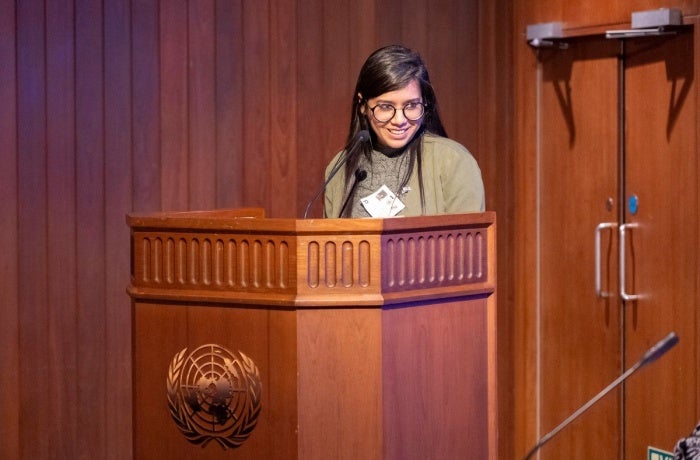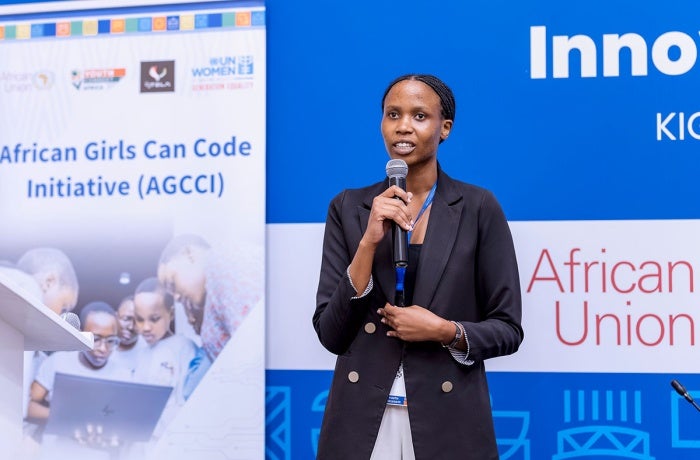Op-ed: Three asks on gender equality to COP27
On today’s Gender Day at COP27, the Executive Director of UN Women lays out what the UN Climate Conference must deliver to advance gender equality.
Our latest research tells us that the world is not on track to achieve Sustainable Development Goal 5—in fact it is 300 years off. Raised ambition and accelerated action for our planet absolutely require the full and equal participation and leadership of women and girls, in all their diversity. Without gender equality, there is no climate justice. Gender equality is the crucial missing link in the achievement of all our grand plans, including the 2030 Agenda and the Sustainable Development Goals, the Agreed Conclusions of the UN Commission on the Status of Women (CSW), the Paris Agreement and subsequent COP outcomes, as well as the collective commitments of Generation Equality.
Our opportunity at COP27 [the 27th Conference of the Parties of the UNFCCC] is to recognize and augment how women and girls are bringing innovative climate actions and other solutions, to understand how our current structures are preventing women’s engagement, and to respond with credible policy and investment measures that take account of the immediate and longer-term impacts of disaster.
Like all crises, the climate crisis has a greater negative impact on women than men. Women and girls are doubly affected—first by the crisis itself, and further by a set of enduring repercussions that are specific to women’s lives, and that we must tackle as an equal priority.
Women play transformative roles in climate change adaptation and mitigation and are at the forefront of environmental and climate justice movements spearheading innovative and effective approaches to promote sustainable energy transitions and agroecology that protect local ecosystems and are based on Indigenous knowledge. Yet damaging imbalances in decision-making processes persist at all levels, from national governments to intergovernmental climate negotiations. These inequalities are present across all the sectors that are vital for increasing climate adaptive capacity, including energy, agriculture, water infrastructure, and education.
My first ask to COP27 is to take special measures, including quotas, to increase women’s and girls’ full, equal, and meaningful participation and leadership at all levels of decision-making, and to address inequalities including in their access to and control of productive resources such as finance, technology, and land, especially women from poor and marginalized communities.
We also must act in parallel to address the other factors that exclude and constrain women. As things stand, many women will simply not be able to take up opportunities for increased engagement, whether adding their voices and solutions to decision-making bodies or taking up their full share of the estimated 24 million new jobs in green sectors worldwide.
Crises bring in their wake an inexorable and chilling intensification of all forms of gender-based violence in both public and private settings—including domestic abuse, trafficking, child marriage, attacks on human rights defenders, and cyberviolence. Crises also sharply increase the burden of care, with enormous implications for women’s engagement outside the home, including their ability to contribute to climate action. During the COVID-19 pandemic, women did an additional 512 billion hours of unpaid care work. Millions left the labour market and have not yet returned. These are compounding losses further stimulated by the climate emergency that demand urgent action.
My second ask to COP is therefore to support a just transition for women through an alternative development model. This model would expand gender-responsive public services, universal social protection, health and care systems, integrating measures both to generate a care economy and to prevent and eliminate violence against women and girls in climate policies and actions. It would also foster sustainable transport and infrastructure with guaranteed new and decent jobs.
CSW66 was clear: we must integrate a gender perspective in the design, funding, implementation, and monitoring and evaluation of all national climate plans, policies, and actions. It also urged its Member States and other stakeholders to expand gender-responsive finance, as does the UNFCCC’s Gender Action Plan.
Only an estimated 0.01 per cent of global official development assistance addresses both climate change and women’s rights. Making the necessary structural measures requires intentional global investments that respond to the crises and support women’s organizations, women’s leadership, and programmes.
My third ask is that COP’s decisions on global investments, especially for women and girls in developing countries, intentionally and directly amplify and foster women’s skills, resilience and knowledge, ensure that women’s organizations, including young women, are supported and protected, and include specific investment to remove critical barriers for women and put protections in place.
Our best counter-measure to the threat multiplier of climate change is the benefit multiplier of gender equality. Let us make this a foundation of our global solidarity and our global response.
Reprinted with permission from UN Climate Change LinkedIn.









